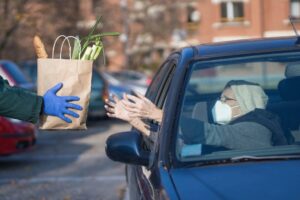Search
AS FOOD PRICES RISE, UWBA CONTINUES OUR FIGHT AGAINST HUNGER
November 23, 2021
By Kevin Zwick
At this stage in our pandemic recovery, typical economic indicators are pointing upwards, including new hires and wage gains. Despite these improvements, however, the average American is struggling. In fact, the Consumer Sentiment Index has fallen to its lowest level in a decade, meaning that consumers are feeling even worse about current and future economic conditions than they did in the early days of the pandemic.
One explanation is the current surge in prices for basic necessities. A Government report revealed that the cost of food has gone up in the Bay Area, with meat, poultry, fish, and egg prices up by 13.6% and overall inflation rates the highest they’ve been in three years. This trend is especially concerning given that 25% of Households in the Bay Area do not earn enough to meet their basic needs as it is. This number is even higher for communities of color, with 47% of Latino households and 41% of African American households not earning enough to make ends meet.
UWBA mobilizes the Bay Area to dismantle the root causes of poverty and build equitable pathways to prosperity. Ensuring that our neighbors are fed is foundational. But we can’t do it alone. A spirit of community, collaboration, and United Way Bay Area’s deep community connections spanning nearly a century help ensure everyone has the opportunities and resources needed to thrive.
UWBA donors support programs in the community that assist those living in poverty and our work to dismantle the cycle of poverty in the Bay Area, including our efforts to provide groceries and meals to neighbors struggling to afford enough to eat. Last year, United Way Bay Area and our local partners provided over 5 million meals to those in need and distributed $4.8 million to more than 120 Bay Area hunger-fighting organizations that assist members of the community facing food insecurity, from college students to seniors on fixed incomes.
Through our Basic Needs programs and cross-sector partnerships, we provide individuals and families with shelter, food, and healthcare. These include:
● 211 Bay Area: A free helpline that connects callers with health and human services in their community.
● SparkPoint: Centers work with low-income individuals and families long-term, looking at all aspects of their financial health, with the goal of achieving financial prosperity.
● National Emergency Food and Shelter Program (EFSP): Federal funding to help struggling Bay Area residents access food, shelter, rent or mortgage assistance, and help with bills and utilities. Money allocated through this program to Bay Area organizations is distributed through UWBA.
● Emergency Assistance Network (EAN): The EAN of Silicon Valley provides emergency services to people in need through various member agencies.
● Labor Partership: UWBA and Bay Area Labor Councils assist working families in times of crisis.
The breadth of these programs allows us to reach Bay Area residents facing hunger across demographics and geographies. For example, Oakland-based Mercy Brown Bag is a UWBA grantee-partner organization through EFSP and provides over 7,000 older adults with groceries twice monthly. They work to provide their clients with nutritionally-balanced food and have taken on delivery services due to the pandemic. Because their clients are especially at risk when it comes to COVID exposure, it’s vital that they maintain this service, even as food and gas prices rise and volunteers are harder to come by. To bridge the gap, UWBA has funded Mercy Brown Bag’s delivery fees. We also refer local seniors in need to Mercy Brown Bag through our 211 helpline, which further connects callers to our other services and helps them sign up for government assistance.
According to Mercy Brown Bag Director Krista Lucchesi, EFSP funding helps to ensure they can continue safely delivering healthy groceries to their clients and allows them to afford pricier items like protein, which have seen the highest jump in prices among basic food items. Protein is especially important for older adults to include in their diet, and some of Mercy Brown Bag’s clients simply would not be getting a sufficient amount if it weren’t for their deliveries.
We’re proud to support Mercy Brown Bag and the many other local nonprofits in our network that are working to address hunger and poverty in their communities during this challenging time. As we enter the holiday season, we would like to express our gratitude for our partners and supporters and wish all Bay Area residents a safe, happy, and healthy season.



